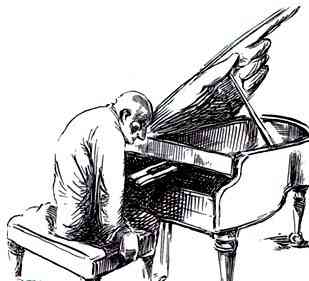|
|

Jewish World Review / July 14, 1998 / 19 Tamuz, 5758
Thomas Sowell
IT'S ESPECIALLY PAINFUL to me to listen to the same old arguments of the 1960s being
rehashed once again as part of Bill Clinton's supposedly new national "dialogue" on
race. It so happens that I have spent the past 16 years researching and writing a
series of three books on race and culture around the world. What I found in the course
of this long project contradicts virtually everything that is being said and assumed in the
one-sided "dialogue" being conducted by Clinton and his supporters.
What I discovered in the course of my 16 years of research, including circling the globe
twice in the process, is that statistical disparities among groups is the rule -- not the
exception -- in countries around the world. Many of these disparities, whether in income
or IQ, are at least as great as those between blacks and whites in the United States.
Most of these other countries have histories that are very different from the history of
the United States, so the factors that supposedly explain intergroup differences here
are often not present there. Yet the differences are.
Nor are these differences due to "stereotypes," as some keep repeating like a mantra.
Differences in performances are quite real, so it can hardly be surprising that there are
differences in rewards. Moreover, these differences often endure for centuries.
In Malaysia, for example, the Chinese minority received a hundred times as many
engineering degrees as the Malay majority during the decade of the 1960s. They
received these degrees at institutions controlled by Malays. There was no way these
disparities were due to discrimination, because the Chinese were in no position to
discriminate against the Malays.
At the same time, the majority population of Nigeria, living in its northern provinces,
provided less than 10 percent of that country's university students. In Poland and
Hungary between the two world wars, Jews were no larger percentage of the
populations of these countries than blacks are today in the United States. Yet an
absolute majority of the physicians in both countries were Jews.
In the heyday of the Ottoman Empire, the Turks who ran the empire were wholly
unrepresented among the leading financiers in its capital city of Istanbul. In earlier
centuries, the leading financiers in London were not Englishmen but Italians, which is
why there is today a Lombard Street in London's financial district.
None of this was due to discrimination, but to differences in skills. Yet we treat a
pattern that is common around the world as if it were strange and sinister here. And we
take as our norm something that is virtually nowhere to be found on this planet -- an
even distribution of peoples in occupations, institutions and income levels.
Even though blacks in the United States have been subject to far more discrimination
than blacks in Brazil, the black-white difference in income is greater in Brazil. This
would be inexplicable if discrimination were the overwhelming factor that it is claimed to
be. But such differences are readily explainable in terms of the different cultural
histories of blacks in the two countries.
If discrimination were the key factor, then blacks in the United States would be among
the poorest blacks in the hemisphere and blacks in Haiti would be the most prosperous,
since Haitians have been free of white rule for two centuries. Yet it is Haitian blacks
who are the poorest in the hemisphere and American blacks who are the most
prosperous in world.
You don't even need to leave Washington, D.C., to see that discrimination is not the
be-all and end-all depicted by Clinton and his supporters. Until the 1950s, the
Washington public school system was racially segregated and discrimination was
rampant. Yet the black academic high school in Washington held its own and often
outperformed most of the white academic high schools in the city on tests as far back
as 1899, nearly a century ago.
Today, with far more resources and a city controlled by blacks, there is no hope of any
such academic performance within the foreseeable future. There are many reasons for
this, but the all-purpose explanation of discrimination just does not fit these facts.
You are not going to solve today's problem with yesterday's
 Race dialogue:
Race dialogue:
same old stuff
At the heart of these retreaded 1960s arguments is the notion that statistical disparities
between groups are strange and sinister, and can only be explained by discrimination
based on "stereotypes."

Willy-One-Note?
Will -- can -- Clinton & Co.
change their tune?

7/10/98: Honest history
7/09/98: Dumb is dangerous
7/02/98: Gun-safety starts with
parental responsibility
6/30/98: When more is less
6/29/98: Are educators above the law?
6/26/98: Random Thoughts
6/24/98: An angry letter
6/22/98: Sixties sentimentalism
6/19/98:Dumbing down anti-trust
6/15/98: A changing of the guard?
6/11/98: Presidential privileges
6/8/98: Fast computers and slow antitrust
6/3/98: Can stalling backfire?
5/29/98: The insulation of the Left
5/25/98: Missing the point in the media
5/22/98: The lessons of Indonesia
5/20/98: Smart but silent
5/18/98: Israel, Clinton and character
5/14/98: Monica Lewinsky's choices
5/11/98: Random thoughts
5/7/98: Media obstruction of justice
5/4/98: Dangerous "safety"
5/1/98:
Abolish Adolescence!
4/30/98: The naked truth
4/22/98: Playing fair and square
4/19/98: Bad teachers"
4/15/98: "Clinton in Africa
"
4/13/98: "Bundling and unbundling
"
4/9/98: "Rising or falling Starr
"
4/6/98: "Was Clinton ‘vindicated'?
"
3/26/98: "Diasters -- natural and political"
3/24/98: "A pattern of behavior"
3/22/98: Innocent explanations
3/19/98: Kathleen Willey and Anita Hill
3/17/98: Search and destroy
3/12/98: Media Circus versus Justice
3/6/98: Vindication
3/3/98: Cheap Shot Time
2/26/98: The Wrong Filter
2/24/98: Trial by Media
2/20/98: Dancing Around the Realities
2/19/98: A "Do Something" War?
2/12/98: Julian Simon, combatant in a 200-year war
2/6/98: A rush to rhetoric